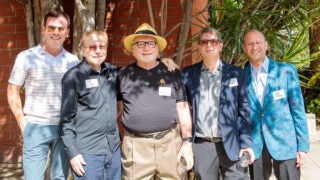Laptop program narrows digital divide for college-bound foster youth
Nonprofit asks USC professor to evaluate the effect of giving computers to teens in the foster care system
In today’s tech age, growing up without access to a computer and the internet is a major disadvantage.
For most adolescents, it’s not an issue; 90 percent of teens in the United States have a computer in their home. However, it’s a different story for youth in foster care.
“We live in an increasingly digital world, and the divide between those with internet access and those without is getting smaller,” said Jeremy Goldbach, an assistant professor at the USC School of Social Work. “But kids in the foster care system are still being left out.”
Less than 20 percent of foster youth own a computer, with even lower rates in rural counties throughout California. That disparity might play a role in higher dropout rates, less success on the high school exit exam and lower rates of college graduation among foster youth.
That’s where iFoster enters the picture. The California-based nonprofit launched an innovative program in 2012 after its founder, Serita Cox, kept hearing from teens and caregivers that not having access to a computer is a common challenge.
“If you look in the literature, there is nothing about the digital divide or access to technology for foster youth,” she said. “But when we asked this community what was needed, this was the top request across the country.”
With funding from various child welfare agencies, philanthropic foundations and individual donors, the program began providing laptops to college-bound teens in the foster care system. Thousands of computers have been distributed throughout the United States, including more than 2,000 in Los Angeles County, thanks to funding from the nonprofit Foster Care Counts and support from the county’s Department of Children and Family Services.
But Cox wanted to do more. She envisioned broadening the program’s reach and prompting legislative changes that would ensure all foster youth had access to a computer.
It’s not just about giving them a laptop. It’s about evaluating the program and developing a model that can be replicated nationwide.
Serita Cox
“It’s not just about giving them a laptop,” she said. “It’s about evaluating the program and developing a model that can be replicated nationwide.”
Examining the evidence
Foster Care Counts asked Goldbach to evaluate the effect of iFoster’s laptop efforts on academic performance by surveying participants before they received a computer and following up with them a year later. He also added measures focused on general life satisfaction, including social and emotional factors.
The results floored Cox.
“Grades went up, missed school days went down, they applied to college more and they applied to jobs more,” she said. “At the same time, self-esteem went up, depression went down and thoughts of suicidality went down.”
Because the study didn’t include a control group, Goldbach is more cautious about drawing direct connections between receiving a laptop and seeing improvements in those various domains. However, he said the results are promising and indicate the need for more research on technology access in the foster care system.
He also noted that findings from interviews with participants in the laptop program backed up his statistical analyses.
“They said things like it’s been really important for them to be able to do their homework on their own time, to not have to use a shared computer in their foster home, to not have to go to the library or do their work at school,” Goldbach said. “They also said it makes them feel more like their friends and that they feel like they fit in more.”
For some, having a laptop simply made life easier. That certainly was the case for Lucero Noyola, who came across the iFoster program while searching for resources to support her as she pursued a college degree.
An academic lifeline
A native of South Gate, she had grown up relatively unsupervised because both of her parents worked full time to support the family. By middle school, Noyola had landed in the juvenile probation system for fighting and using drugs. After three years of cycling through various rehabilitation options, including house arrest and juvenile hall, she was sent to a group home.
Although Noyola initially tried to run away from the facility, the openness and willingness of the staff to welcome her back to the program gave her hope and a renewed focus.
“It was really a way to become someone completely new,” she said. “They treated me more like an actual person and not like a criminal. I had a voice.”
Six months later, after she had become a model resident, the juvenile court allowed her to move back in with her parents. Noyola focused on education, enrolling in adult school to make up missing credits and ultimately graduating from high school on time.
“Education has been my lifeline,” she said. “I’ve found community and work and a way to make a living.”
Around the time she began taking classes at East Los Angeles College, Noyola came across the iFoster laptop program. It proved serendipitous, particularly when she transferred to USC and had to commute from a transitional living facility in Whittier. She would often get home from campus late in the evening, when the local library had closed and there were few options for free wireless Internet.
The transitional housing complex had WiFi in its community room, but it was closed at night and her apartment wasn’t close enough to pick up the signal.
“Sometimes I would be up at 4 in the morning doing homework, and I wasn’t about to go sit outside just to get close to the community room,” Noyola said.
At that time, iFoster provided a free WiFi card with its laptops, so she could remain in her apartment and look after her young daughter, Aurora. That access became especially crucial as she pursued a double major in sociology and psychology with a heavy emphasis on research.
She has since upgraded her laptop and moved into an affordable housing unit a few miles north of USC that offers wireless Internet, but Noyola remains grateful for the support she received from iFoster.
“It was also a way for me to research what kinds of resources were out there,” she said. “I didn’t have a social worker, so the only way I found out about these things was by researching them online.”
Noyola is now earning her master’s degree in social work at USC and plans to pursue a doctorate and an academic research career. She is interested in issues involving probation, teenage mothers, foster youth and low-income families.
A big payoff
That type of success story is encouraging to people like Winnie Wechsler, a board member with Foster Care Counts, an all-volunteer nonprofit focused on improving the lives of youth in foster care in the Los Angeles region.
“The cost of this is so little — to think you only have to spend $250 to have this kind of impact,” she said.
The immediate payoff of the program paired with the initial findings from Goldbach’s survey has inspired a statewide initiative among nonprofits and philanthropists to fund similar efforts in their communities, Wechsler said, and there is increasing attention being paid to the issue by legislators and other public officials.
In particular, there is growing recognition that having a laptop and access to technology in general is no longer considered a luxury.
Certainly for teenagers, connectedness is a big part of today’s culture. If you don’t have a laptop, you just aren’t part of that culture.
Winnie Wechsler
“Social media and the communication elements of using laptops are central to our lives,” Wechsler said. “Certainly for teenagers, connectedness is a big part of today’s culture. If you don’t have a laptop, you just aren’t part of that culture.”
Cox recently presented the program’s initial research findings to federal officials and Silicon Valley leaders during a White House technology event and received favorable feedback. With more evidence, preferably from a randomized controlled trial, that the program has benefits in terms of self-esteem, academic performance and mental health, she is confident the federal government will add technology access to foster care requirements.
Once the process is codified, she envisions adding additional support options — like training and jobs programs focused on science, technology, engineering and math — that would help foster teens develop skills that can lead to high-paying jobs and successful careers.
“Here’s something that in the grand scheme of things is super simple, but it has a major impact,” Cox said. “Sometimes something really small can move the needle.”



